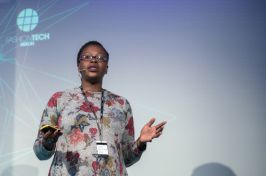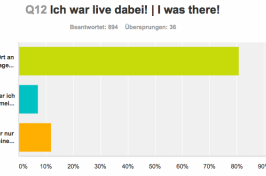British activist Ruth Daniel explained why it's important to not just think about people's basic needs in a time of crisis, but also about the role of arts and creativity, in her session "Art: What is it good for?".
What constitutes a basic need? This was Ruth Daniel's initial question. Hands were raised when she asked the audience about food, water and housing. Art? Only a few hands go up. "Music and creativity are essential" Ruth Daniel responded. Growing up in Burnley, a small town near Manchester, she found her way to music early on. She got a guitar when she was ten and later even bagged a record deal. Ruth played concerts around the world and was able to witness what music can mean to people's lives.
So, why not bring art to the war zones of the world? Aid organisations scoffed at the idea. And yet, we see it manifesting itself everywhere: Art shows people alternatives to the status quo. As an example, Daniel names the political satire show "Zambezi News", which has managed to change people's political mind-set in Zimbabwe. There didn't used to be satire, nobody spoke openly about politics. Today, the show reaches a total audience of nine million through streaming and DVDs. People are talking about politics. There are even festivals in the capital where the "Zambezi News" does live shows.
Another example Ruth Daniel highlighted was the Colombian city of Medellin - Pablo Escobar's hometown, one of the biggest drug dealers of all time. The drug war had been in full sway for decades, gangs controlled the city. Medellin youth wanted to find an alternative and discovered Hip Hop for themselves. They managed to get their hands on some cardboard, so that they could practice breakdance, using the Hip Hop of the 1980's as their benchmark with a special focus on the rap group Public Enemy. Today, there are over 2,500 rappers in the city. The music has made an upwards trend possible in the city. “Art can be an escape. It's also political and can give people hope" Ruth Daniel explained.
Image: re:publica/Gregor Fischer (CC BY 2.0)





